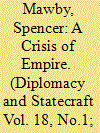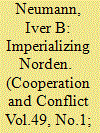| Srl | Item |
| 1 |
ID:
076731


|
|
|
|
|
| Publication |
2007.
|
| Summary/Abstract |
The crises which accompanied the rise and decline of the European empires have not been the object of systematic study in the manner of superpower crises of the Cold War period. Many of the techniques used to study Cold War crises have broader scope, including the models of governmental politics and organisational process developed by Graham Allison. The application of the Allison models to the events surrounding the delimitation of the Aden frontier between 1901 and 1905 illuminates significant aspects of the Anglo-Ottoman confrontation: they explain the manner in which non-rational elements in the policy-making process transformed a relatively insignificant issue into a crisis situation. Such insights also require a detailed examination of the documentary record which in this instance reveals the discord amongst British policy-makers and the organisational imperfections of the bureaucracy. The frontier Commissioners, the Aden Resident, the Government of India, the metropolitan government in London and the embassy in Constantinople were involved in a series of factional squabbles over the Aden frontier, the resolution of which often required the coercion of the Ottomans by the deployment of warships along the Yemen coast. Coordination amongst these different elements in the bureaucracy also played a role in generating tensions between London and Constantinople. The case of the Anglo-Ottoman dispute over the Aden frontier suggests that the analysis of internal governmental politics and organisational processes can be applied successfully to crises of empire which predate the Cold War era.
|
|
|
|
|
|
|
|
|
|
|
|
|
|
|
|
| 2 |
ID:
129444


|
|
|
|
|
| Publication |
2014.
|
| Summary/Abstract |
The two pre-Napoleonic Nordic polities are best understood as empires. Drawing on recent analytical and historical scholarship on empires, I argue that 17th and 18th century Denmark, on which the piece concentrates, was very much akin to the other European empires existing at the time. Read in this light, national identities within the fragments of the empire appear similar. Nationalisms are all shaped directly on the Danish model, having at the same time Denmark as their constitutive cultural other. The introduction notes that, where all European imperial experiences are concerned, overseas territories had the most wounds inflicted upon them. We would not know this if we considered Faroese, Icelandic and Norwegian nationalism in isolation. These polities, Norway in particular, participated in and benefited from the colonial policies of the empire. This notwithstanding, their national identities insist that these nations were on the receiving - as opposed to the imposing - end of imperialism. This is a historically unwarranted and ethically problematic stance requiring further discussion.
|
|
|
|
|
|
|
|
|
|
|
|
|
|
|
|